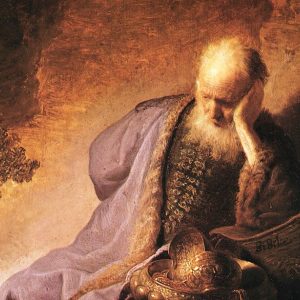Bible Study for Atheists: America, One Nation Under Whose God?
This Bible study for atheists looks at what Thomas Jefferson meant when he wrote about God in the Declaration of Independence. Many evangelical or political Christians argue that the US is a “Christian” country because Jefferson used the word. Michael Goldfarb challenges that idea which explores the Enlightenment use of God as Nature. Far from the scriptural understanding of the Judeo-Christian divinity. He traces Jefferson’s ideas back to those of Enlightenment philosopher Benedict Spinoza. He uses Spinoza’s own bible study as a way of explaining what the founding father’s intentions were.
Spinoza, who wrote in Latin, coined the phrase Deus sive natura, God or Nature. Nature for Spinoza is is all there is. YOu can call it God if you like but it does not cause itself, or create itself. It is not the creator God of the Bible, anthropomorphized, and directing the fate of human beings and particularly the Israelites, his chosen people.
This was pretty revolutionary theory, for the late 17th century. By the late 18th century Jefferson and the Founders were moving it out of the realm of speculation and putting it into practice in the Bill of Rights, the First Amendment to the Constitution.
This is the second Bible Study for Atheists, a semi-regular feature of the FRDH podcast. Response to the first Bible Study for Atheists was overwhelmingly positive and is still regularly listened to at the FRDH podcast website. This edition of Bible Study for Atheists will provide background for those who wish to keep religion out of government in America and need to argue with evangelical friends and neighbors about why.
The FRDH Podcast is hosted by internationally acclaimed journalist Michael Goldfarb and is about History. The History he has reported on; the History he has written about; and the long History he has lived.
You can subscribe to the podcast on iTunes, YouTube and Soundcloud, and you can follow us on Facebook and Twitter.
You can also donate to keep the episodes coming.
The FRDH Podcast is hosted by internationally acclaimed journalist Michael Goldfarb and is about History. The History he has reported on; the History he has written about; and the long History he has lived.
You can subscribe to the podcast on iTunes, YouTube and Soundcloud, and you can follow us on Facebook and Twitter.
You can also donate to keep the episodes coming.
